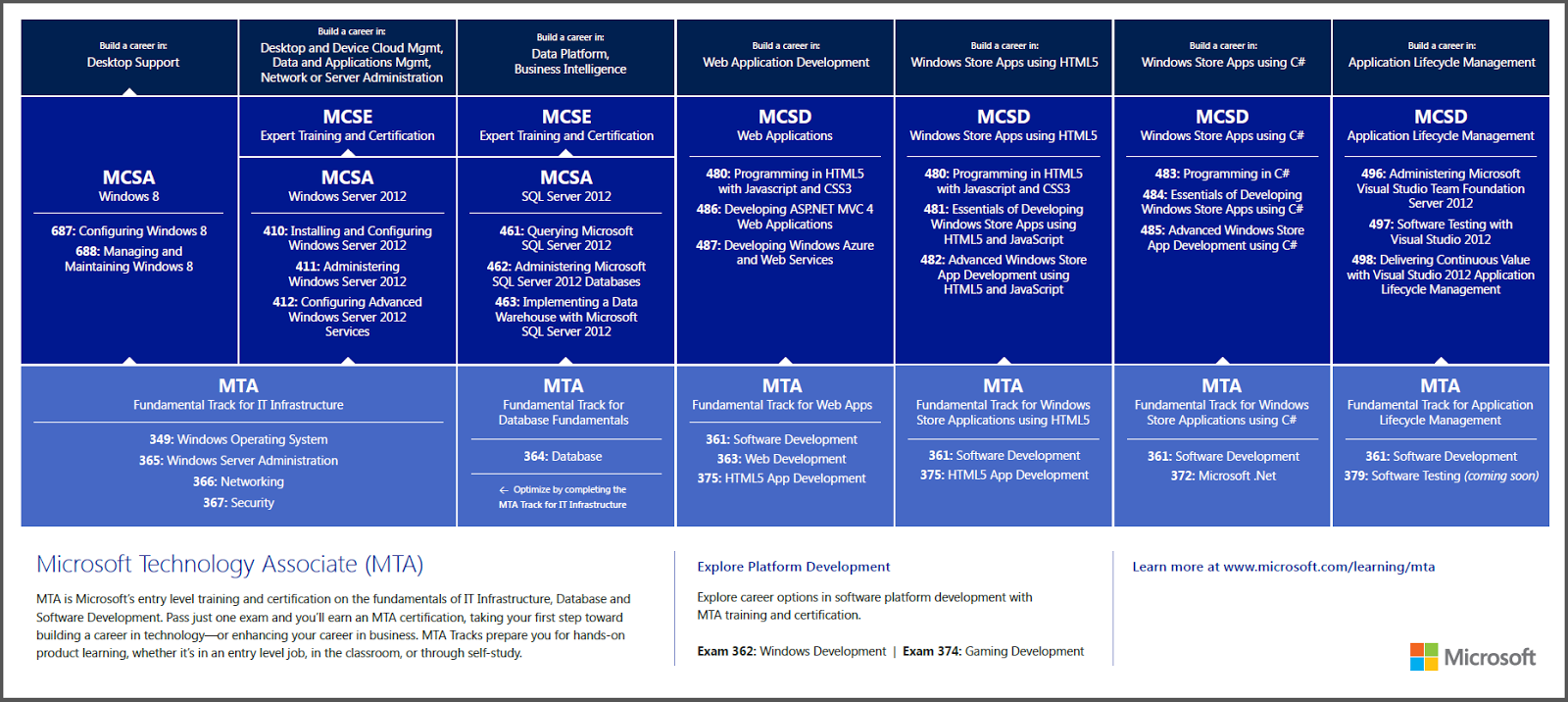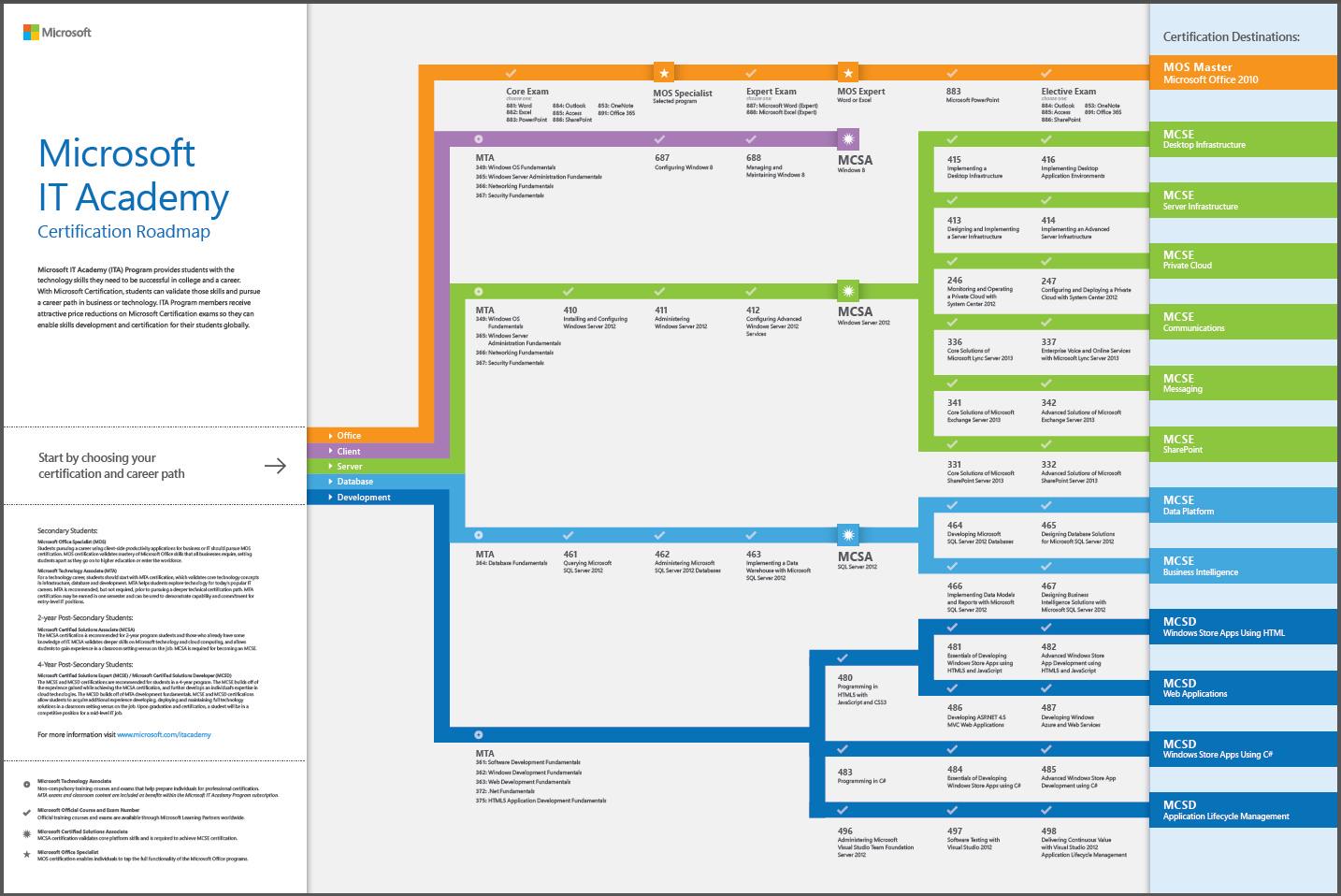Where do I get started?
One of the questions I get asked the most often when it comes to certifications and IT career planning is "Where do I even get started?". The field of IT can seem overwhelming especially if you are taking your first steps into the IT world either through an entry level position or a career change. There are so many different specialties and even within those specialties there are many different certifications.
How do I know what I am studying will help with my career and frankly how do I even know if I want to go that route?These are good questions and questions that no one can answer except you. However, I would like to offer some guidance.
I won't tell you what field to specialize in but I can help you discover what you like. Many people start off with CompTIA A+ and that is a great launch pad, the beauty of CompTIA is that all their certifications are vendor neutral or agnostic meaning they don't focus on a particular software or way of doing something but more on the overall picture. Getting pigeon holed into a particular software early in your career can have some negative effects (this is not always true but it can be). I like to relate it to my own story of buying a guitar. When I was first starting to play guitar I immediately wanted to upgrade my starter guitar to something cooler. I had only been playing for a few months and bought a moderately priced super fast rock guitar, although quite pricey to me. After having played for a bit longer I realized that I wish I had waited. I should have played until I figured out what I really wanted to do, then spent the money on a guitar that better suited my now less rock shred style; lesson learned and later applied to my career. All that to say it doesn't really make sense to load up on tech certs before you figure out what your really want to do. Why go out and get your CCNA if you realize later that you don't want to do networking at all but you really like virtualization? You would be better served to figure out what you want and apply your time, study, effort and money to something that will assist you in the career that you want like maybe VMware, Citrix or Hyper-V. Having said all that we circle back to the initial question of
"Where do I even get started?"CompTIA isn't the only horse in the race when it comes to entry level certs but they do have that vendor neutral thing we talked about earlier but I want to talk about another company that has started doing something similar...drumroll...Microsoft. Yes Microsoft, you can tell my social media name of @MSTrainerGuy that I have Microsoft blue in my blood but I really am excited about MS entering this space. The MTA (Microsoft Technology Associate) is their semi-new entry level certification suite. This certification is much less software specific and gives more theoretical, high level views of technology sets. They are a fantastic way to get your feet wet in a technology without having to devote tons of time to study. I work in SQL and databases are part of my everyday life but I have found the study materials to be informative and applicable to me well beyond entry level in my career. MTA has several different paths and each of those is a great learning platform and entry level certification.
Here is the link the Microsoft learning page that will show
you some more info on each track.
Please note that both tracks [IT Infrastructure] and
[Development] have many different options (There is only a single test under
the database umbrella so it is usually lumped into a single category with Dev
as Development/Database). You only have to pass one of the tests inside a track
to get MTA certified in that area. For example, under IT Infrastructure there
are 4 different exams so if you studied for and took test 349 for Windows
Operating System Fundamentals you would get your MTA certification in that
particular unit.
(Click image to access larger version on OneDrive then click download at the top to snag a PDF)
After viewing the image go back to the link above and click on a Track then click on a test number that you
think sounds interesting which will take you to info page for that exam. Look
at what it covers and peruse around a bit. Once you find one you think you might
want to tackle find it on the site below and read up. The info in the link
below is not comprehensive and study of the material alone will probably not
prepare you for the exam but it is a great start and great to read even if you just want info and you are interesting in sitting for the exam.
After studying one of the track go through the exam objectives
on the exam page and try to fill in any holes you see in your knowledge. I offer MTA exploration sessions from time to time so feel free to comment or email me to get more information if you prefer classroom or one on one instruction. Many times I will offer overviews and next step intro sessions for no cost at all.
Below is a broader graphic on how Microsoft
certification paths flow. It might give you a good overview of where you might
want to head after tackling an MTA cert.
In summary:
- Figure out what you want to do, then leverage any certifications to help you get there, not the other way around. Please don't get a certification because you think it sounds cool then look for a career in that field just because you have the cert. Think about it, look at some of things I have provided and search elsewhere to find what you are really interested in. The world of IT becomes much more manageable when you can focus a bit.
- Tackle an entry level cert - one that you are interested in - and plan out your next one. Your certs should bolster your career plans not dictate them.
- Don't forget to consider Microsoft MTA, even if you aren't wanting to marry Microsoft at this moment MTA is a great path that will give you some overarching knowledge and will help you with whatever software specifics you choose.
Let me know if you have any other questions; feel free to askme anything.
@MSTrainerGuy
Daniel Kimberlin (MCT, MCSA -Legacy, MCSA,
MCITP, MCTS, MCP, A+)


thanks just the information I needed now , find where your passion in it is and be rewarded for it
ReplyDeleteNigel